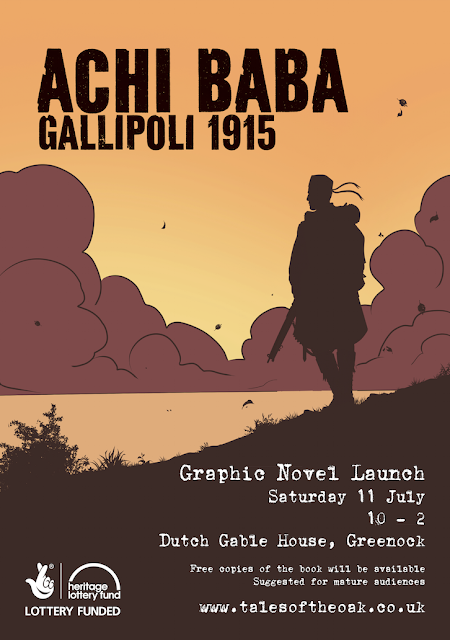Monday, 22 June 2015
Achi Baba - "Stand in the trench Achilles..."
Our projects tend to focus on myths, legends and storytelling, and in researching Achi Baba, we were really struck by how, even at the time, the whole effort was associated with The Iliad - turning it into this heroic epic. There's an immediate and obvious contrast with the much less romantic reality of life and war on the peninsula and comics are an especially effective medium for blending those contrasting views and voices together.
We have adapted verses from one poem in particular, Patrick Shaw Stewart's 'I Saw A Man This Morning', which perhaps explores this classical link more explicitly than any other. The poem was written by Shaw Stewart while in hospital in Imbros, preparing to return to the theatre of war in Gallipoli. He links the campaign with Helen of Troy both directly and through rhyme and repetition, and then imagines Achilles in battle.
There is a grim foreshadowing in Shaw Stewart's poem, in hoping that Achilles will 'shout' for him, he is referencing the moment in the Iliad, when Achilles learns of the death of his comrade Patroclus - and lets loose a terrifying battle cry, while the Gods crown him with fire. The narrator of the poem, in identifying himself with Patroclus, is imagining himself soon to be dead. Shaw Stewart did in fact survive the Gallipoli campaign, but not the war.
There is an excellent book about the many ways the Iliad was referenced in the poetry of the First World War, which takes its title from Shaw Stewart's poem - 'Stand in the Trench Achilles by Elizabeth Vandiver'. Of course, The Iliad continues to be referenced and reframed in war stories and was even used as a way of studying post traumatic stress disorder in Vietnam veterans. It has inspired many graphic novel adaptations, including the wonderful Age of Bronze by Eric Shanower.
If war poetry is of interest to you, then Above The Dreamless Dead, edited by Chris Duffy, provides an entirely different way of experiencing those works, it is a collection of comic adaptations of World War One poetry, and was certainly inspirational in our development of this project.
Subscribe to:
Post Comments (Atom)



No comments:
Post a Comment
Note: only a member of this blog may post a comment.